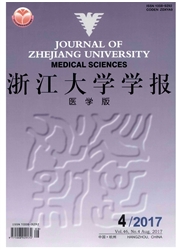

 中文摘要:
中文摘要:
目的:研究黄酮类化合物木犀草素(Luteolin)对体外抗肿瘤细胞增殖,以及其与抗肿瘤药联用的增敏作用。方法:选用5μmol/L或10μmol/L木犀草素与不同浓度抗肿瘤药联合作用肿瘤细胞24 h后,用MTS法检测其体外抗增殖作用。结果:5μmol/L木犀草素对人非小细胞肺癌细胞(A549)、人子宫颈癌细胞(Hela)、人乳腺癌细胞(MCF-7)、人胃腺癌细胞(AGS)、人胃癌细胞(MGC-803)的抗增殖作用均〈20%,对人结肠癌细胞(Caco2)和人肝癌细胞(HepG2)的抗增殖作用约20%。Bexarotene单一用药时对Hela细胞抑制率达50%(IC50)的浓度约为2μmol/L,与5μmol/L木犀草素联用后IC50约0.2μmol/L,5μmol/L木犀草素与0.1μmol/L Bexarotene联用对Hela细胞的抗增殖作用达44%,Bexarotene与木犀草素联用在MGC-803、HepG2、A549细胞中增敏较小,在Caco2和MCF-7细胞中无增敏作用;顺铂单一用药时对Hela细胞的IC50〉30μmol/L,与5μmol/L木犀草素联用后IC50约3μmol/L,联用后在MGC-803、HepG2和A549中增敏较小;博来霉素单一用药时对Hela细胞的IC50〉100μmol/L,对A549细胞的IC50约为100μmol/L,与5μmol/L木犀草素联用后Hela细胞的IC50约为1μmol/L,与10μmol/L木犀草素联用后A549细胞的IC50约为10μmol/L。木犀草素与格列卫联用在MGC-803、HepG2、A549和AGS中增敏较小。结论:木犀草素在低于10μmol/L浓度时,对肿瘤细胞体外抗增殖作用较小。低浓度(5μmol/L~10μmol/L)的木犀草素在不同的肿瘤细胞中对抗肿瘤药的增敏作用强度不同,在Hela细胞中增敏作用最显著。
 英文摘要:
英文摘要:
Objective: To investigate the effect of Luteolin alone or combination with chemotherapentic drugs on the cytoxicity of cancer cells.Methods: Cultured A549,Hela,MCF-7,AGS,MGC-803,Caco2 and HepG2 cells were treated with Luteolin or the combination of Luteolin with other chemotherapeutic agents(Bexarotene,Cisplatin and Bleomycin).Cell viability was measured by MTS assay and IC50 was calculated.Results: The IC50 of Bexarotene to Hela cells was 2 μmol/L,but with the combination of 5 μmol/L of Luteolin that reduced to 0.2 μmol/L.However,the combination of Bexarotene and Luteolin did not show significant benefit in MGC-803,HepG2 cells,Caco2 and MCF-7 cells.The IC50 of Cisplatin to Hela cells was over 30 μmol/L,but it decreased to 3 μmol/L in the presence of 5 μmol/L Luteolin;Luteolin also sensitized Cisplatin in MGC-803,HepG2 and A549 cells studied.The IC50 of Bleomycin to Hela cells was over 100 μmol/L,but it was about 1 μmol/L in the presence of 5 μmol/L Luteolin.A549 cells were resistant to Bleomycin with an IC50 of 100 μmol/L,10 μmol/L Luteolin greatly enhanced the cytotoxicity of Bleomycin to the cells with the IC50 of about 10 μmol/L.The inhibitions of MGC-803,HepG2,A549 and AGS cells didn't change by combination of Luteolin.Conclusion: Low concentration of Luteolin has little toxic effect on the cancer cell lines tested in the study,but it can sensitize chemotherapeutic drugs in various cancer cell lines.
 同期刊论文项目
同期刊论文项目
 同项目期刊论文
同项目期刊论文
 期刊信息
期刊信息
